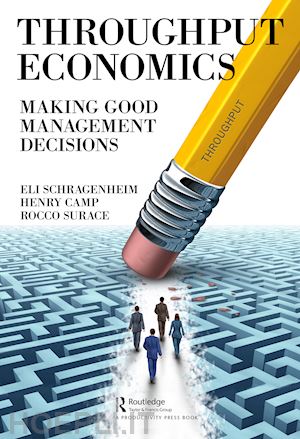Eli Schragenheim is a well known international management educator, author and consultant active in various fields of management like corporate strategy, decision support, innovation, supply chain, project management, shop-floor control, IT and HR. He worked with huge variety of organizations all over the world, including public-sector organizations, industrial, high-tech and start-ups. Since he had joined Dr. Eliyahu M. Goldratt, the famous creator of the Theory of Constraints (TOC) in 1985, Eli Schragenheim had taught, spoke at conferences and consulted all over the globe, including the US, India, China, Japan, Canada, Britain, Russia, Brazil, Colombia, Israel, Germany, Italy, Belgium, South Africa and Australia. He taught and trained high-level managers and consultants to use TOC in the most effective way in all the above countries. Many of his past pupils are now practicing TOC in the highest levels. Eli Schragenheim is also known for his own software simulators and management games designed to experience the thinking and potential of the Theory of Constraints (TOC) in complex environments. Eli Schragenheim was a partner in the A.Y. Goldratt Institute and a director in The Goldratt Schools. He manages his own company Elyakim Management Systems (1992) Ltd. He served twice as a board member of TOCICO – the TOC International Certificate Organization, a non-profit organization that was created by Dr. Goldratt to spread the TOC knowledge in the world. He is now serving his third round as board member of TOCICO. Eli Schragenheim is the author of several books on various aspects of management. His first book Management Dilemmas (1998) showed a variety of problematic situations in management and the rigorous analysis leading to the right solution. Next he collaborated with William H. Dettmer in writing Manufacturing at Warp Speed. In this book the new concept of Simplified-DBR, now a key concept in production planning according to TOC, was introduced. He also collaborated with Carol A. Ptak on ERP, Tools, Techniques, and Applications for Integrating the Supply Chain, and with Dr. Goldratt and Carol Ptak on Necessary but Not Sufficient. In 2009 his book Supply Chain Management at Warp Speed, with William H. Dettmer and Wayne Patterson was published. He also contributed two chapters for the Theory of Constraints Handbook, edited by Cox and Schleier published in 2010 by McGraw-Hill. In March 2015, Eli has opened a blog, now containing more than 90 articles on various topics in TOC that everybody can access. The URL is www.elischragenheim.com. Henry Fitzhugh Camp is a practical entrepreneur who has bought, started and run companies for over 30 years. All of his endeavors have been successful without a single business failure, despite many bumps in the road. While studying at the University of Virginia, he started his first business, which spread to several other college campuses and multiple licensees. After earning a BA in Mathematics, he taught math for several years before starting work as a computer programmer for a small distributor. Over the next few years, he designed and programmed his own ERP system to improve the company’s operational effectiveness. After five years, he bought the company and still owns it today, having grown sales tenfold during that time. www.shipperssupplyco.com. During this time, Mr. Camp developed: 1) significant expertise in structuring a business to achieve its goals, 2) became an expert in administering and interpreting personality assessments in order to properly fit people to the necessary roles within a company’s structure and 3) learned about the different challenges during the predictable lifecycles of a business. Using these and his programming skills, he developed a warehouse management system (WMS) that achieved and maintained for years six sigma (6s) inventory accuracy (error rates of 3.4 parts per million or 99.9966%). A customer with over $4 billion in annual sales implored Mr. Camp to manage their $70 million raw material inventories in 4 different countries. New software was created and deployed. Within months, IDEA’s five warehouses in four countries all demonstrated 6s inventory accuracy. More importantly, the client’s shortages disappeared, which had previously delayed manufacturing plants from producing about a third of their planned production schedules. Moreover, the inventory required dropped roughly 70%. This spin off became IDEA, LLC of which Henry owns a majority. www.ideallc.com IDEA has grown into seven countries, added many new clients. IDEA went on to provide supply chain consulting, using software based on the Theory of Constraints (TOC) replenishment solution. By this time, Henry had formed a personal relationship with Eli Goldratt and his son Rami as a Goldratt Consulting client. A major client was adidas, who used IDEA’s Elucidate software to double their same store sales without increasing inventory or operating expenses. (For a 7 minute video on ou












